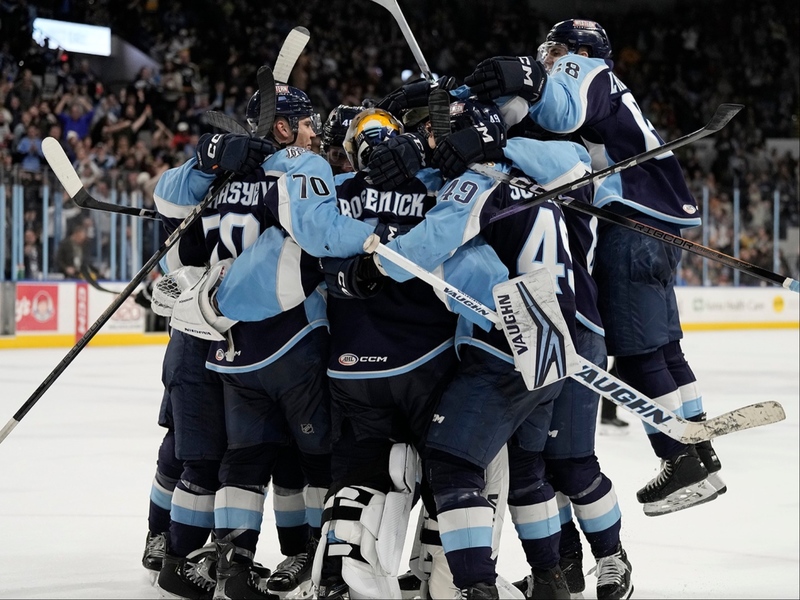In recent weeks, we've spent some time talking about the prospects for a bunch of sports in our area, including the PGA Tour stop, the Milwaukee Wave and auto racing at the Milwaukee Mile.
Those discussions lead, inevitably, to the issue of just how many sports can Milwaukee really support. In other words, how much is too much?
We've got a lot. For the purposes of this discussion, I'm giving the Milwaukee Metropolitan Area the Packers. I know they're in Green Bay, but they are as much ours as they are theirs.
So, we've got a pro football team, a pro baseball team, a pro basketball team. We've got two Division I college basketball teams (Marquette and UWM). We've got a minor-league hockey team in the Admirals. We've got indoor football teams in the Iron and Bonecrushers. For the time being, we've got an indoor soccer team and top-class auto racing as well as a PGA tournament.
You've got to add to the mix the recreational sports opportunities in our area. We've got better and more public golf courses than just about any other city in the country. We have cross country skiing and tennis courts all over the place.
The Milwaukee Metropolitan area ranks 27th in the country. We come off pretty good in comparison with other members of that group. We have more sports than at least 10 larger metro areas, including: Cleveland, San Diego, St. Louis, Pittsburgh, Tampa, Portland, Seattle, Cincinnati, Kansas City and Sacramento.
It's difficult to use statistics to figure out whether a community is able to support a particular sporting endeavor. There have been many studies that show the economic benefit of having a lively sports scene in your town. There have also been many studies showing that the economic benefit is basically smoke and mirrors and that the main benefit of having a sports team in your city is psychological.
Add to this field the studies that say people and families spend money they don't have in order to attend sporting events, thereby increasing familial financial stress.
I don't think that you can turn to science to answer the question of how many sports a city can support. I think that market forces are a better barometer, although not the only one.
In short, if a team can make it, fine. If not, the market has spoken. That's a popular notion, but I don't think it's entirely accurate.
A team or endeavor could fail, for example, because of mismanagement. Because racing may end at the Milwaukee Mile does that mean that Milwaukee is not a good race town that will support the track? Of course not. Everybody knows this is a good race town. People will buy tickets to the races. It's bad management and incredible debt that has forced the present problems afflicting the track.
The Wave is another example. Well managed, the Wave appeals to a miniscule but loyal group of fans. Very simply, the reason the Wave may fail is because the team, even with all of its on-field success, can't attract enough fans to make a go of it.
One thing to understand about professional sports: the only way you make money as an owner is if you can hold on to the team for awhile and then sell it. It's virtually impossible to make money on ticket sales and broadcast rights and concession revenue. Ticket sales are important as a barometer of community support as well as a revenue stream.
So, can numbers be the determining factor as to whether a community has more sports than it can support? I don't think so.
I'm from the school that says an active sports life in a town helps to identify that town as a major-league city with room for lots of activities. That's why I don't just like theater. I like ballet and opera and the symphony and the art galleries, too.
I think there's a psychological benefit to having lots of sports teams in your town. And that's why I favor, almost without exception, public support of things like the arts and sports teams. When I think about all the money that government wastes on stuff we either don't want or don't need, I can't help but think how much better off we'd all be if that money went to the stuff we like.
With a history in Milwaukee stretching back decades, Dave tries to bring a unique perspective to his writing, whether it's sports, politics, theater or any other issue.
He's seen Milwaukee grow, suffer pangs of growth, strive for success and has been involved in many efforts to both shape and re-shape the city. He's a happy man, now that he's quit playing golf, and enjoys music, his children and grandchildren and the myriad of sports in this state. He loves great food and hates bullies and people who think they are smarter than everyone else.
This whole Internet thing continues to baffle him, but he's willing to play the game as long as OnMilwaukee.com keeps lending him a helping hand. He is constantly amazed that just a few dedicated people can provide so much news and information to a hungry public.
Despite some opinions to the contrary, Dave likes most stuff. But he is a skeptic who constantly wonders about the world around him. So many questions, so few answers.







